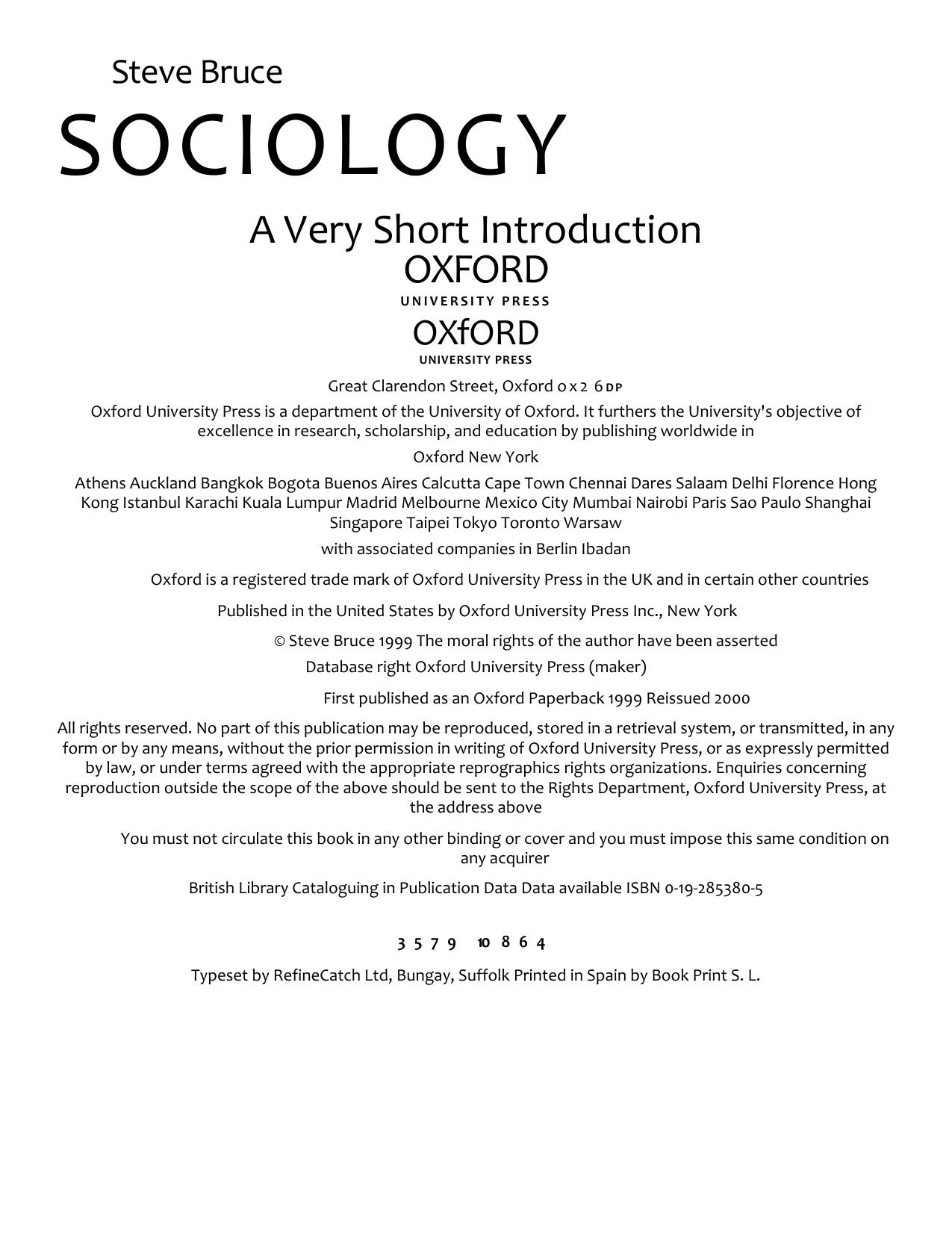Sociology: A Very Short Introduction by Steve Bruce

Author:Steve Bruce
Language: eng
Format: mobi, pdf
Tags: Sociology, Customs & Traditions, Labor, General, Business & Economics, Social Science
ISBN: 9780192555809
Publisher: Oxford University Press
Published: 2018-09-20T19:01:31.728318+00:00
Chapter 4
The
Modern
World
The observer and the observed
Sociology has an unusual relationship with its subject matter. Although we can view it as a disinterested intellectual discipline that stands aside from the world it observes, sociology is itself a symptom of the very things it describes.
In his work on Puritans in science, Robert Merton argued that the religion of the Jews and then Christianity were rationalizing forces. By having just one God instead of a pantheon of deities (who often operated erratically and at cross purposes), and by confining God to creating and ending the world but not interfering much in between, Christianity permitted a scientific attitude to the material world because it assumed the world to be orderly. Furthermore, the material world was not itself sacred in any sense that inhibited its systematic study. Once the Reformation had rejected the authority of the Roman Church, scientists were free to pursue their scholarship unhindered by religious imperatives. According to Merton, what made modern science possible was not technical advances in instrumentation so much as a new way of looking at the world.
A similar case can be made for why sociology appears when it does. The fourteenth-century Arab philosopher Ibn Khaldun or the ancient Greeks Plato and Aristotle made sociological observations in the course of their philosophical and historical writings, but it is not until Adam Smith, David Hume, and Adam Ferguson at the end of the eighteenth century that we find, in what was collectively called the `Scottish Enlightenment', a body of academic work that would be recognizable to modern sociologists, and it is not until the twentieth century that the discipline flourishes. This is not an accident. In a traditional society with a coherent and all-embracing culture, few but powerful social institutions, and an all-pervasive religion that adds divine authority to those social institutions, it is not easy to see the world as socially constructed. Though some people might know that things could be different and might even have travelled to foreign parts, the solidity of their own taken-for-granted social world would crush any relativizing impact of such knowledge. The weakening of traditions, the decline of religious legitimations for the social order, and increasing social diversity are all necessary preconditions for sociology.
Modernity
This seems a good point to spell out in a little more detail the distinctive features of modern times. By 'modernization' I mean the social consequences of an increase in the ratio of inanimate to animate power. Unless Von Daniken is right about the spacemen, the ancient Egyptian pyramids were built by men and beasts with only levers and inclined planes to lighten the burden. We build with machines driven by fossil fuels, which massively increases our productive capacity. This account of what follows from that can be no more than a cartoon sketch, but it will summarize what sociology sees as distinctive about the social formations that concern it (in contrast to the traditional societies that are studied by anthropologists).
Manufacturing work has become ever more finely divided. Tasks, and the
Download
Sociology: A Very Short Introduction by Steve Bruce.pdf
This site does not store any files on its server. We only index and link to content provided by other sites. Please contact the content providers to delete copyright contents if any and email us, we'll remove relevant links or contents immediately.
Zero to IPO: Over $1 Trillion of Actionable Advice from the World's Most Successful Entrepreneurs by Frederic Kerrest(4500)
Machine Learning at Scale with H2O by Gregory Keys | David Whiting(4290)
Never by Ken Follett(3931)
Harry Potter and the Goblet Of Fire by J.K. Rowling(3843)
Ogilvy on Advertising by David Ogilvy(3598)
Shadow of Night by Deborah Harkness(3356)
The Man Who Died Twice by Richard Osman(3068)
Book of Life by Deborah Harkness(2928)
The Tipping Point by Malcolm Gladwell(2909)
Will by Will Smith(2904)
0041152001443424520 .pdf by Unknown(2843)
My Brilliant Friend by Elena Ferrante(2823)
Purple Hibiscus by Chimamanda Ngozi Adichie(2811)
How Proust Can Change Your Life by Alain De Botton(2801)
How to Pay Zero Taxes, 2018 by Jeff A. Schnepper(2643)
Hooked: A Dark, Contemporary Romance (Never After Series) by Emily McIntire(2544)
Rationality by Steven Pinker(2349)
Can't Hurt Me: Master Your Mind and Defy the Odds - Clean Edition by David Goggins(2319)
Borders by unknow(2301)
